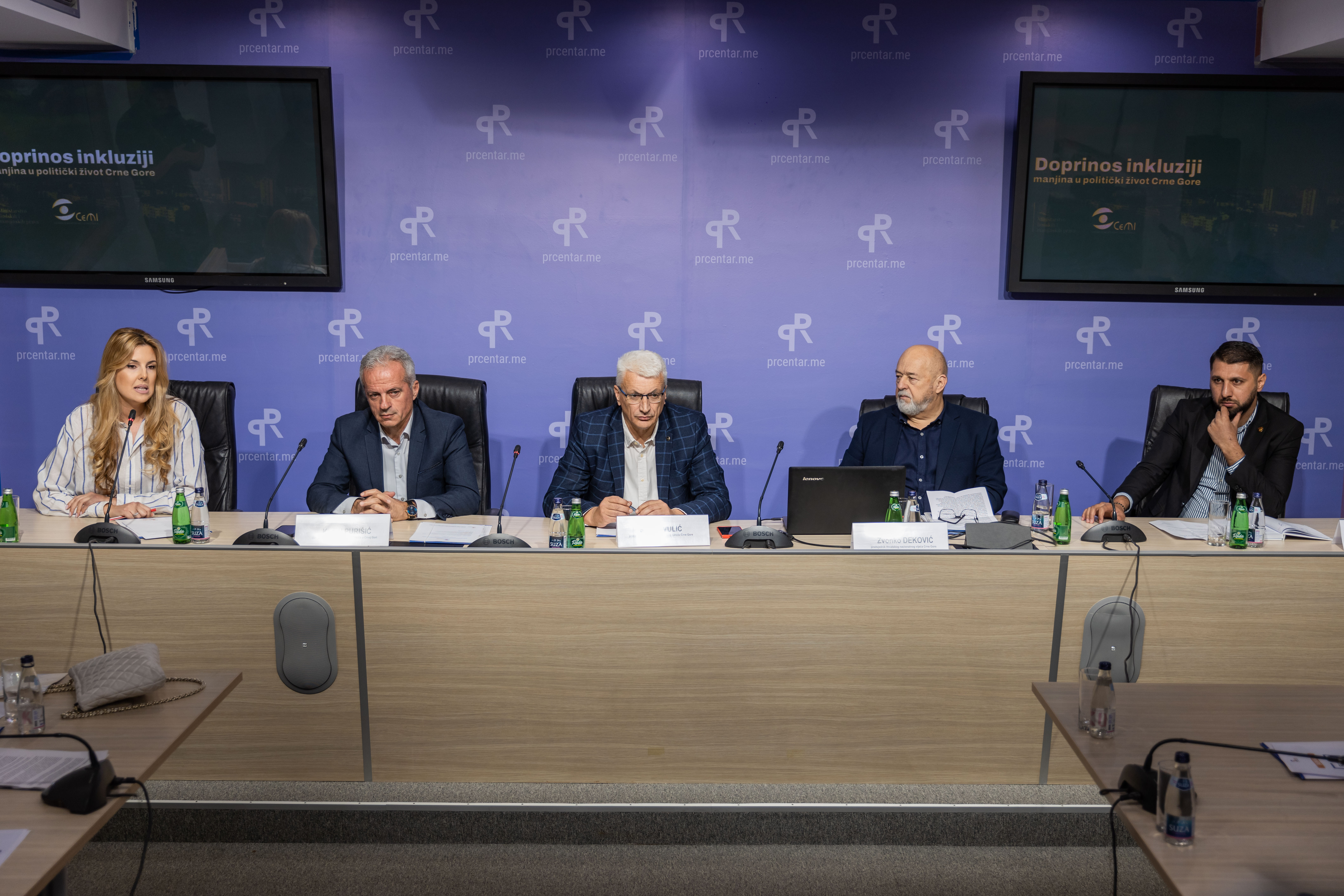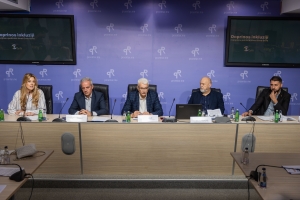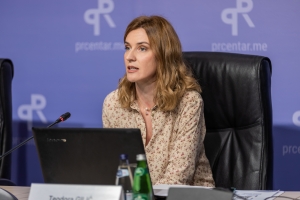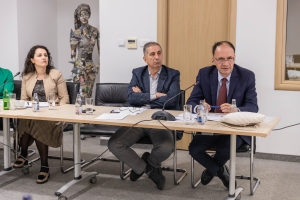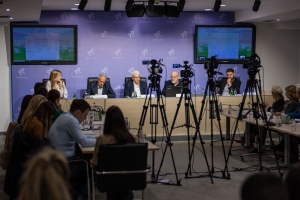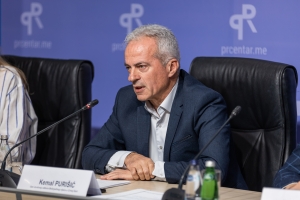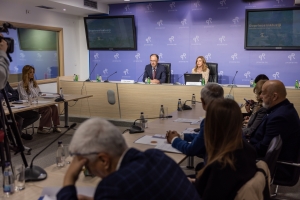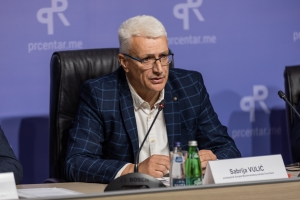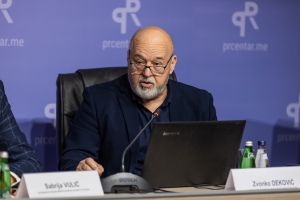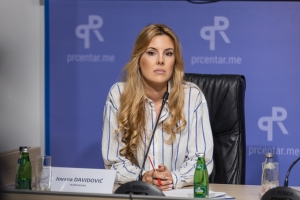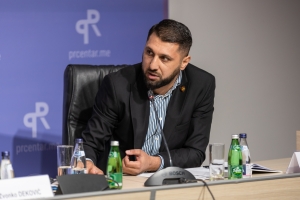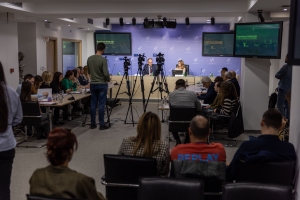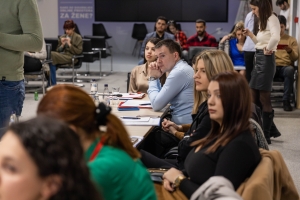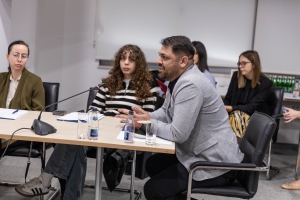In Montenegro, significant steps are necessary to foster greater political participation among minorities and other national minority communities. This imperative calls for legislative reforms alongside the bolstering of political education and empowerment initiatives aimed at facilitating their active engagement in political life. These sentiments were articulated at our conference titled "How to Achieve Effective Participation of Minorities and Other National Minority Communities in the Decision-Making System?"
Teodora Gilic, the Program Director of the Centre for Monitoring and Research, highlighted that the system protecting minority rights in Montenegro is an evolving framework requiring continual enhancement to achieve fundamental equality and alignment with the highest international legal standards in this domain.
"Unfortunately, despite the recognized need for changes, there has been no improvement in reducing the underrepresentation of certain minority groups in the Montenegrin Parliament. The absence of revisions to the Law on Election of Councillors and MPs serves as a barrier to enhancing the inclusion and participation of the RE community in Montenegro's political landscape. Additionally, Muslim citizens lack authentic representation in the Montenegrin Parliament," stated Gilic.
She emphasized the critical need to persistently strive for improvements in the legislative framework to ensure heightened political participation of minorities. "Primarily, it is imperative to reform electoral legislation, which would entail, among other things, establishing mechanisms for achieving proportional representation of minorities in political institutions. Furthermore, there is a pressing need to intensify efforts to strengthen political education and empower minority communities to enable their active participation in the political process," said Gilic.
These measures, as she underscored, are pivotal for fostering a more inclusive political environment and ensuring the equality of all citizens in Montenegro.
"The dissemination of education on human rights, multiculturalism, and the significance of political participation is pivotal for nurturing a tolerant and inclusive society," stated Gilic.
The Representative of the Directorate for Promotion and Protection of Rights of Minorities and other Minority Communities in the Ministry of Human and Minority Rights, Fikret Lulanaj, emphasized that political participation is a complex phenomenon that has been the subject of numerous theoretical discussions and research endeavors conducted over decades in various socio-political contexts.
"For democracy, as a form of political regime to function, it is necessary to have active citizens who participate within the democratic system. Therefore, it is imperative for minorities and other national minority communities to participate in the decision-making processes," stated Lulanaj.
He reminded that in Montenegro, there are six national councils, expressing his belief that they should serve as the "governments of the minorities in Montenegro."
"Participation or representation of minority members in the political and public life of Montenegro has a stronghold in the existing legislation. The Constitution of Montenegro, in Article 79, guarantees authentic representation of minority members in the Parliament of Montenegro and the Parliaments of local self-governments where minorities constitute a significant or majority part of the population," said Lulanaj.
Furthermore, he added, the Law on Election of Councillors and MPs closely defines the constitutional guarantee of authentic representation in the Parliament of Montenegro for minorities and other national minority groups.
"Furthermore, the Law on Minority Rights and Freedoms stipulates that if elected MPs, according to the principle of affirmative action and in accordance with the electoral legislation, find that the proposed act significantly encroaches upon their national interests in Montenegro, the submitter of the request and MPs will harmonize their positions. I believe that this position is pivotal for the minorities," stated Lulanaj.
During the panel on 'How to achieve a higher political participation of minorities in Montenegro?', the President of the Roma Council, Mensur Saljaj, assessed that the Roma people are facing discrimination regarding the census provided by the Law on Election of Councillors and MPs.
"I believe that the 0.7 percent threshold will be impossible for us to achieve. As President of the Roma Council, yesterday I submitted an initiative for changing the census from 0.7 percent to 0.35 percent to the Council for comprehensive electoral reform," stated Saljaj.
He highlighted his optimism about this initiative and expressed hope that the Europe Now Movement and its coalition partners, along with the opposition, will exert every effort within their power to reduce the census.
President of the Council of the Muslim People, Sabrija Vulic, reminded that in the 1991 census in Montenegro, around 14 percent of the citizens identified as national Muslims, a number that decreased to 3.9 percent in the 2003 census, and further to 3.3 percent in 2011.
"According to surveys conducted by the non-government sector last year in June in Montenegro, 3.9 percent of the population identified as ethnic Muslims. I am positive that the results of the new census will show half that amount because of various influences such as political pressure, pressure from the Islam community, and other factors that occurred during the census campaign," stated Vulic.
He indicated that since 2001 in the governments of Montenegro, there has been only one minister who identified as a Muslim and who was a member of a civil party.
"When it comes to minorities and other minority national communities, we are the worst off. Our analyses reveal that the majority of ethnic Muslims reside in urban areas, are civic-oriented, and participate in civil parties, albeit in insufficient numbers," said Vulic.
He expressed concern over the consequences of this situation, noting that at present, there is not a single MP in the state Parliament who identifies as an ethnic Muslim, and he believes a similar scenario exists in local Parliaments.
"According to the official 2011 census, which is still in force, there were 3.3 percent Muslims in Montenegro, approximately around 21 thousand. If we subtract family members who are not adults and do not have the right to vote, the number dwindles further. The starting position in the political life of Muslim or Roma representatives compared to Bosniaks, who outnumber us threefold, is unequal. Having 60 thousand potential voters compared to 20 thousand makes a significant difference," stated Vulic.
He highlighted the challenges Muslims face in starting an electoral race as minorities, especially those with 30 percent or more representation.
"In Podgorica, according to the latest census, there are 4.5 thousand Muslims, including children, those with and without the right to vote. From that number, we are supposed to gather 1.5 thousand signatures. One-third of all Muslims must sign the candidate's list for the local Parliament in Podgorica. The same census also includes civil parties," said Vulic.
He expressed his belief that Muslims enter "the political match as complete outsiders."
"There is no justice; our starting positions are unequal, therefore, minorities are completely deprived. Concrete actions are needed for representation. We should start with the local Parliament. It might be beneficial to draw from the experiences of countries in the region to find a way for minority representatives to participate in the political life of Montenegro. The consequences of neglecting this issue are severe. We may simulate democracy, but without representation in the Government, assimilation is inevitable," Vulic emphasized.
The President of the Croatian National Council of Montenegro, Zvonko Dekovic, elucidated that Croatians require, based on the 0.35 percent census, every other member of the Croatian population to cast their vote for the Croatian Civic Initiative to attain representation in Parliament.
"Demonstrating the challenge further, Albanians necessitate that every fourth or fifth Albanian supports Albanian parties to secure their census for parliamentary representation, while Bosniaks require support from every twelfth to thirteenth member of the Bosniak population. This reality renders our task nearly insurmountable," remarked Dekovic.
He elaborated that if another civil party were to emulate the Croatian model, receiving every other vote from its supporters, "that party would wield unparalleled authority and potentially govern Montenegro single-handedly."
Dekovic contends that pursuing European integration represents the optimal strategy for advancing minority and human rights.
The member of the executive board of the Bosniak Council in Montenegro, Kemal Purisic, expressed concern that the political elites comprising the Government disregard international standards embedded in Montenegrin legislation.
"Pertaining to the Bosniak party, despite having three mandates in 2006, it failed to secure a place in the Government. In 2009, it only managed to secure one ministerial position without portfolio, despite having adequate mandates to merit at least one or two ministers. The current situation reflects a lack of genuine political will for the integration of Bosniaks into the system," stated Purisic.
He emphasized the necessity to initiate amendments to the Law on Minority Rights and Freedoms.
"We must establish a framework whereby our constitutional norms translate into tangible actions, with clear timelines and agendas aimed at upholding the constitutional principle of proportional representation. If we lack clear timelines and it takes another 100 years to achieve proportional representation, then democracy is compromised," concluded Purisic.
The conference is part of the project 'Contribution to the Inclusion of Minorities into the Political Life of Montenegro,' financially supported by the Ministry of Human and Minority Rights of Montenegro.
